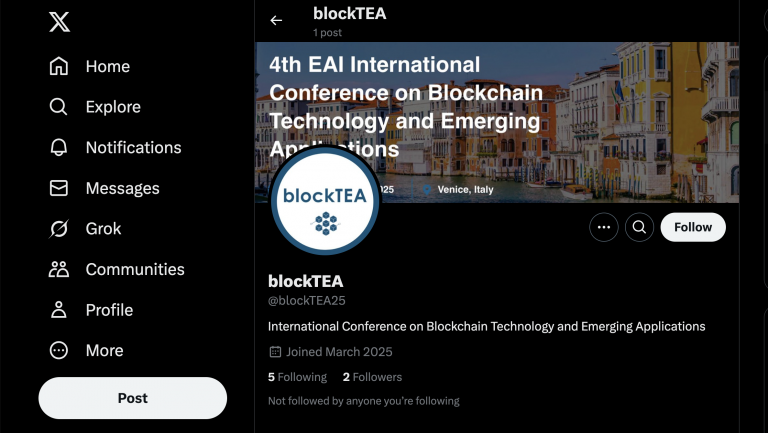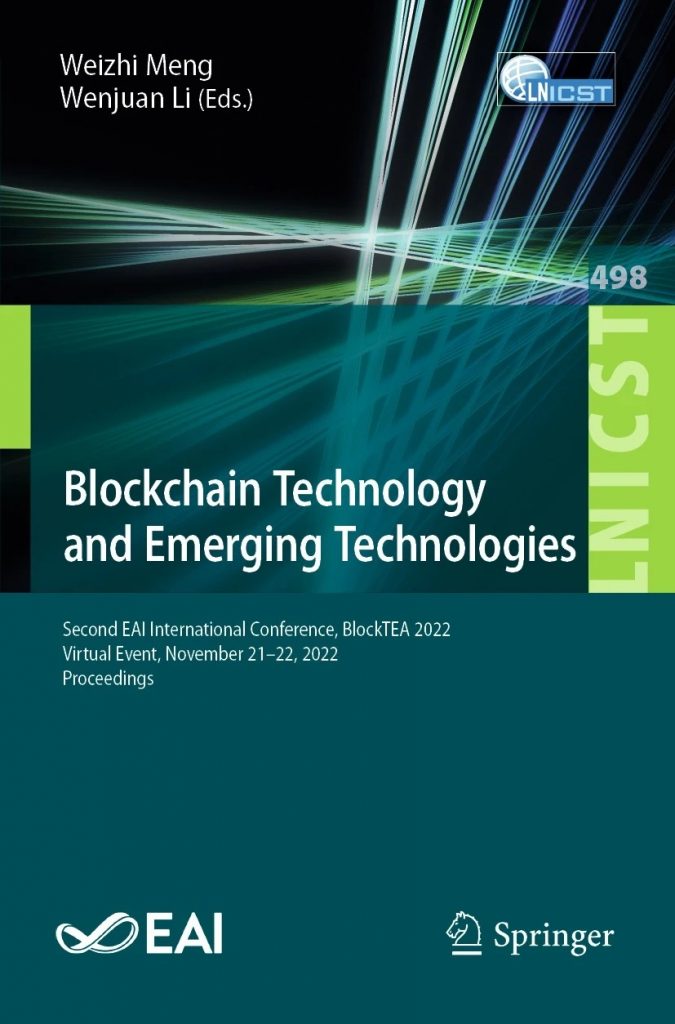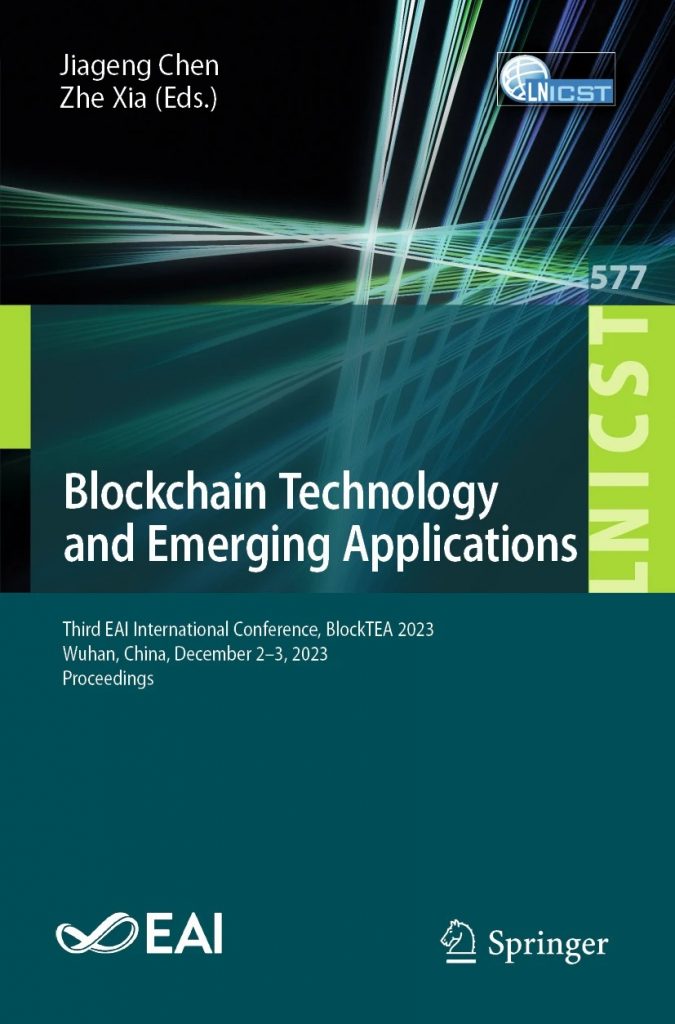4th EAI International Conference on Blockchain Technology and Emerging Applications
Proceedings have been published in Springer Digital Library.
18 - 19 September, 2025
Venice, Italy
4th EAI International Conference on Blockchain Technology and Emerging Applications
Why Attend?
Motivated by the success of cryptocurrency, blockchain technology has been emerging as a potential technology to be applied in various domains, including finance, computer science, electronic engineering, agriculture, healthcare and more. The blockchain-based emerging applications are able to aid the current systems and networks by leveraging the benefits provided by blockchain technology, such as a decentralized, immutable, and cryptographically secured ledger. The aim of BlockTEA is to bring together researchers and practitioners from different disciplines and discuss the recent advancement in blockchain and its emerging applications.

- Accepted Papers from 15+ Countries
- Workshop- IOT in Health Research
- Exciting Social Program
- Insightful Posters Session
EAI blockTEA 2025
- 18 – 19 September, 2025
- Venice, Italy
Motivated by the success of cryptocurrency, blockchain technology has been emerging as a potential technology to be applied in various domains, including finance, computer science, electronic engineering, agriculture, healthcare and more. The blockchain-based emerging applications are able to aid the current systems and networks by leveraging the benefits provided by blockchain technology, such as a decentralized, immutable, and cryptographically secured ledger. The aim of BlockTEA is to bring together researchers and practitioners from different disciplines and discuss the recent advancement in blockchain and its emerging applications.
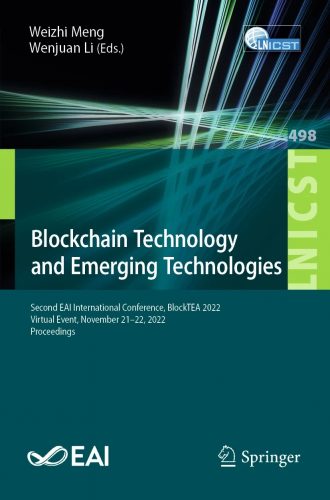
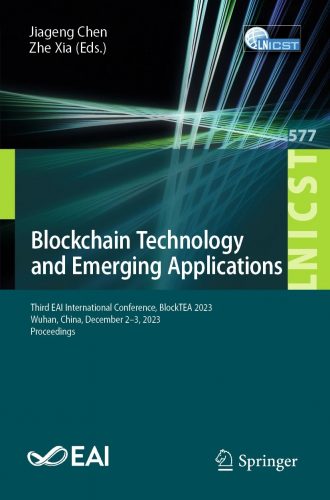
blockTEA conference proceedings received
Conference proceedings
All registered papers will be submitted for publishing by Springer – LNICST series – and made available through SpringerLink Digital Library.
Proceedings will be submitted for inclusion in leading indexing services, such as Web of Science, Compendex, Scopus, DBLP, EU Digital Library, Google Scholar, IO-Port, MathSciNet, Inspec, and Zentralblatt MATH.
All accepted authors are eligible to submit an extended version in a fast track of:
- EAI Endorsed Transactions on Scalable Information Systems (Open Access)
- EAI Endorsed Transactions on Security and Safety (Open Access)
Additional publication opportunities:
- EAI/Springer Innovations in Communications and Computing Book Series (titles in this series are indexed in Ei Compendex, Web of Science & Scopus)
EAI is an open community dedicated to creating an environment where every member receives the same opportunities, benefits and opportunities to develop and grow their research mission and career. As the largest free professional research society in the world EAI offers a complete range of conference proceedings publication opportunities. Based on the qualification of the conference and the conference scope EAI provides the possibility to publish the proceedings for every sponsored conference. Consistent with its mission to support developing communities all EAI sponsored conferences appear in EUDL, the European Union Digital Library (EUDL). EUDL is Open Access and free for EAI members reaching a community of 250,000 subscribers and providing the visibility that allows the conference organizers to develop the conference into a fully fledged indexed proceedings publication in subsequent year.
blockTEA 2025 Deadlines
Poster Notification deadline
- 5 September 2025
Camera-ready deadline
- 24 July, 2025
Keynote Lectures
Beyond the chain: synergies between on-chain and off-chain worlds
Abstract:
As blockchain technology matures, the divide between on-chain and off-chain systems is evolving into a dynamic space of collaboration and innovation. The keynote explores the growing synergies between decentralized, trustless environments and the rich, data-intensive off-chain world. We will examine how hybrid architectures are enabling new use cases by bridging smart contracts with real-world data and processes. Topics include oracle networks and succinct zero-knowledge proofs (zk-proofs) for off-chain computation. While these technologies hold great promise real-world adoption, particularly of zk systems, still faces challenges in performance, tooling, and developer accessibility. By highlighting practical examples and emerging patterns, this talk offers a forward-looking perspective on how combining on-chain integrity, transparency, and incentive mechanisms with off-chain flexibility and computational power can reshape digital trust and enable scalable, real-world blockchain applications.

Andrea Vitaletti
Sapienza University of Rome, Italy
The Economics of Transparency and Centralization in Blockchains: From Mining Cartels to Market Crises
Abstract:
In this talk, I will present our recent works studying the effects of centralization and transparency across multiple layers of blockchain-based systems. Centralization in blockchains can manifest differently across consensus, protocol, and application layers, challenging the simplistic view of decentralized versus centralized systems. I will start by presenting our mathematical model of centralization effects in proof-of-work mining, which quantifies how hash rate concentration and block propagation dynamics affect fork rates and resource efficiency in distributed ledgers. I will also discuss our method for the statistical detection of selfish mining in several proof-of-work blockchains, which offered the first empirical evidence of coordinated strategic behaviour in mining. I will then move to the application layer to present our study on DEX liquidity dynamics during the Silicon Valley Bank collapse, where we focus on the counterintuitive effects of transparency during market stress. We show how USDC’s frequent disclosures led to swift market reactions and reduced dominance, while USDT’s opacity provided relative stability through delayed information propagation. Our empirical analysis builds on a successful stream of financial economics literature about how transparency regimes affect market dynamics. Our work encourages a more critical assessment of the economics of blockchain-based systems. I will conclude by discussing my views on where we should look in the coming years to design appropriate risk management practices for users, developers and regulators, particularly in the context of the growing DeFi-TradFi integration.

Carlo Campajola
University College London, UK


